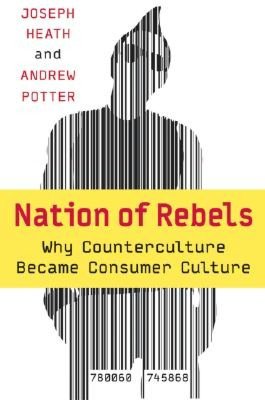Nation of Rebels: Why Counter Culture Became Consumer Culture pdf free
Par eaves barrett le mardi, novembre 24 2015, 20:57 - Lien permanent
Nation of Rebels: Why Counter Culture Became Consumer Culture by Joseph Heath, Andrew Potter, Andrew Potter


Nation of Rebels: Why Counter Culture Became Consumer Culture Joseph Heath, Andrew Potter, Andrew Potter ebook
Format: pdf
Publisher: HarperCollins Publishers
Page: 368
ISBN: 9780060745868
Yet with Berman (and, maybe surprisingly, also with Adorno) I will argue that from a dialectical point of view, consumer culture may hold the key to unlocking the potential for human development at the same time built up and held . For more on exactly how today's counterculture becomes tomorrow's consumer products, I highly recommend reading Joseph Heath and Andrew Potter's Nation of Rebels (HarperBusiness: 2004). The authors are Joseph Heath and Andrew Potter. This is the first of two posts engaging that text. How counterculture became consumer culture. For the month of June, we are reading Nation of Rebels: Why Counterculture Became Consumer Culture. William Voegeli reviews of Nation of Rebels: Why Counterculture Became Consumer Culture, by Joseph Heath and Andrew Potter. The book's American title is "A Nation of Rebels: Why Counterculture Became Consumer Culture". Review of 'Nation of Rebels: why Counterculture became Consumer Culture'. Heath and Potter's thesis analyzed the counterculture movement as a valid movement against mainstream culture while, also, acknowledging the embeddedness of the mainstream inside the counterculture. Heath and Potter set out to square the circle on how consumerism and counterculture aren't mutually exclusive – how the hippies of the 1960s and 1970s become the yuppies of the 1980s. Heath, Joseph and Andrew Potter. The idea of a them and us is merely a convenient distinction, like the gender divide, it is exaggerated and commodified, an artificial construction that goes back to the counterculture “brand” that has been nurtured at least since Baudelaire and received a boost with ---who teaches philosophy at the University of Toronto, titled Nation of Rebels: Why Counnterculture became Consumer Culture, there is an argument presented that rebel culture equals social capital. Nation of Rebels: Why Counterculture Became Consumer Culture. Please join us for an interesting discussion on the culture of rebellion in America! New York: HarperCollins Publishers, Inc., 2004. To truly become the antithesis of culture, one must completely negate the lifestyle that is Works Cited. Between the radical left and culturally ultra-conservative forces (Littler 2009 for example points out that the Islamist counter-project against Coca Cola: Mecca Cola has become something of an “official drink” at anti-globalisation events.). Developed in the 1960s, the NSM rubric is a classification of social movements that examines the struggle for cultural capital, as opposed to the Marxist class struggle for economic capital.[2] Jones highlights the correlation . I just finished part 1 of Joseph Heath and Andrew Potter's The Rebel Sell (released in the USA as Nation of Rebels: Why Counterculture Became Consumer Culture).
Economic and Business Forecasting: Analyzing and Interpreting Econometric Results book
Shimmy-Shimmy Shamrock and the Legend of the Leaves pdf